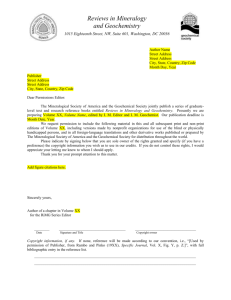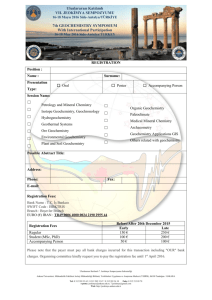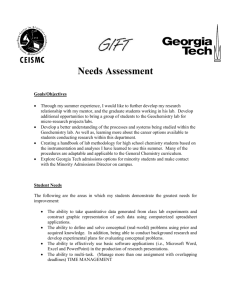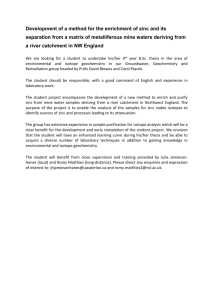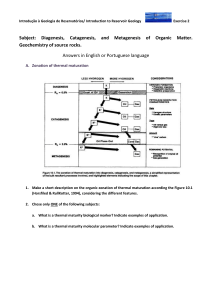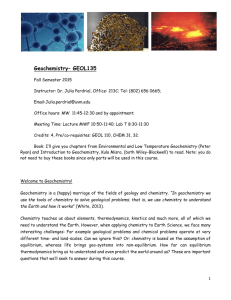Igneous Petrology 412/512
advertisement
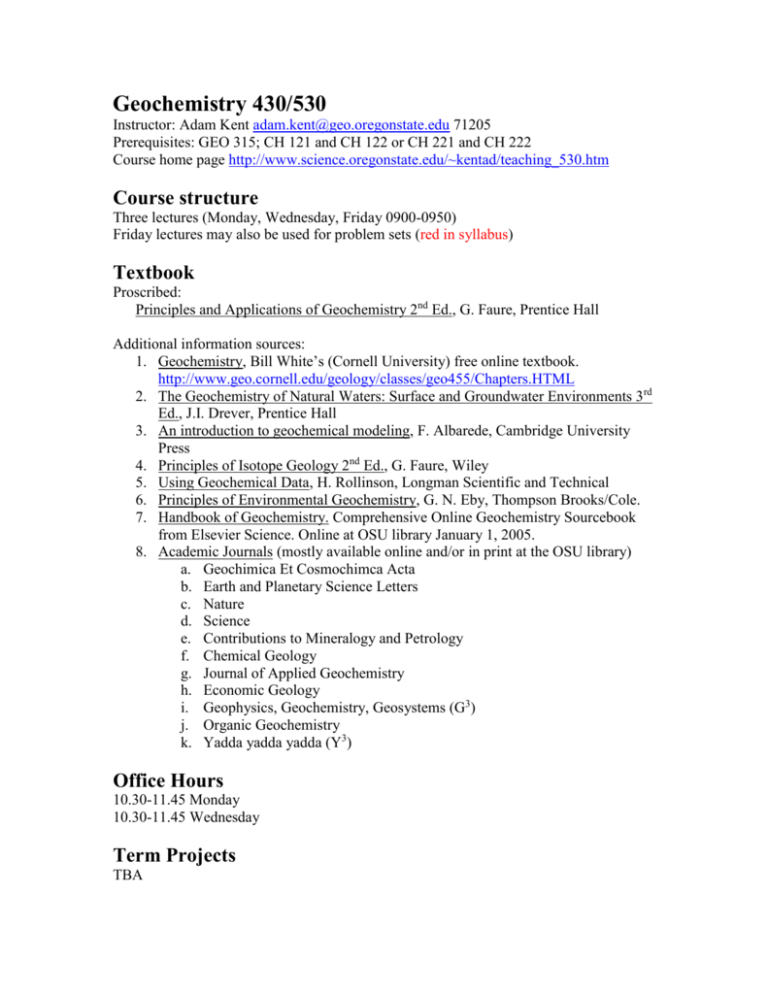
Geochemistry 430/530 Instructor: Adam Kent adam.kent@geo.oregonstate.edu 71205 Prerequisites: GEO 315; CH 121 and CH 122 or CH 221 and CH 222 Course home page http://www.science.oregonstate.edu/~kentad/teaching_530.htm Course structure Three lectures (Monday, Wednesday, Friday 0900-0950) Friday lectures may also be used for problem sets (red in syllabus) Textbook Proscribed: Principles and Applications of Geochemistry 2nd Ed., G. Faure, Prentice Hall Additional information sources: 1. Geochemistry, Bill White’s (Cornell University) free online textbook. http://www.geo.cornell.edu/geology/classes/geo455/Chapters.HTML 2. The Geochemistry of Natural Waters: Surface and Groundwater Environments 3rd Ed., J.I. Drever, Prentice Hall 3. An introduction to geochemical modeling, F. Albarede, Cambridge University Press 4. Principles of Isotope Geology 2nd Ed., G. Faure, Wiley 5. Using Geochemical Data, H. Rollinson, Longman Scientific and Technical 6. Principles of Environmental Geochemistry, G. N. Eby, Thompson Brooks/Cole. 7. Handbook of Geochemistry. Comprehensive Online Geochemistry Sourcebook from Elsevier Science. Online at OSU library January 1, 2005. 8. Academic Journals (mostly available online and/or in print at the OSU library) a. Geochimica Et Cosmochimca Acta b. Earth and Planetary Science Letters c. Nature d. Science e. Contributions to Mineralogy and Petrology f. Chemical Geology g. Journal of Applied Geochemistry h. Economic Geology i. Geophysics, Geochemistry, Geosystems (G3) j. Organic Geochemistry k. Yadda yadda yadda (Y3) Office Hours 10.30-11.45 Monday 10.30-11.45 Wednesday Term Projects TBA Grading ~25 % Homework ~15 % Term project ~15 % Mid-term exam ~35 % Final exam Syllabus Subject to change. Most lecture notes will be available on Blackboard prior (or sometimes after) the lecture. Week 1 Lecture 1 2 3 Subject Introduction Chemical Bonding Ionic Substitutions Reading Faure 1, 5, 6 Faure 9,10 Faure 8 2 4 5 6 Acids, bases and Salts Thermodynamics Mineral stability Faure 9 & 10 Faure 11 Faure 12 7 8 MLK Day Rates of Geochemical processes Geochronolgy Faure 15 Faure 16 4 9 10 11 Radiogenic isotopes Stable Isotopes Isotope calculations TBA Faure 301 5 12 13 14 The Universe & the Solar System Differentiation of the Earth Mid Term Faure 2,3 Faure 4 6 15 16 17 Mixing etc. Analytical Geochemistry Lab Tour Faure 18 TBA 7 18 19 20 Geochemical weathering Geochem of natural waters Tod Jarvis lecture Faure 19 Faure 20 8 21 22 23 Geochemistry of the oceans Disposal of Nuclear Waste Reactor Tour Faure 20 Faure 24 9 24 25 26 Pb and human health Atmospheric Geochemistry Calculations Faure 25 Faure 23 10 27 28 29 Geochemical Cycles I Geochemical Cycles II The great debate Faure 22 Faure 22 3 Course Policies Cell phones should not be used during lectures. Set them to buzz mode if you don’t want to turn them off. Attendance is strongly recommended. If you choose not to come to classes I will feel no obligation to help you learn the material in any other fashion. Late homework and other reports will not be accepted. Learning Outcomes GEO 430 students will be expected to: 1. Acquire specialized language relevant to Geochemistry 2. Analyze and integrate information on concepts relevant to Geochemistry 3. Retain key information on key concepts relevant to Geochemistry 4. Communicate verbally, and through writing, key concepts relevant to Geochemistry 5. Use knowledge acquired from assigned reading and lecture material to analyze and solve problems presented in tests and exercises. 6. Integrate knowledge obtained from a range of sources to understand key concepts relevant to the Geochemistry of Earth materials. GEO 512 students will be expected to: 1. Acquire specialized language relevant to Geochemistry 2. Analyze and integrate information on concepts, including advanced concepts, relevant to Geochemistry 3. Retain key information on key concepts, including advanced concepts, relevant to Geochemistry 4. Communicate verbally, and through writing, key concepts, including advanced concepts, relevant to Geochemistry 5. Use knowledge acquired from assigned reading and lecture material to analyze and solve problems presented in tests and exercises, including advanced problems, and to apply these skills to their own research where applicable. 6. Integrate knowledge obtained from a range of sources to understand key concepts, including advanced concepts, the geochemistry of Earth materials. 7. Demonstrate their ability to obtain, analyze and synthesize information relevant to Geochemistry from a range of external sources, including the scientific literature. Following OSU guidelines GEO 530 students will be required to present work that is significantly more rigorous in both depth of study and methodology than students enrolled for the GEO 430, and evaluations for GEO 530 students will be made at a significantly higher standard than for GEO 430. University Policies: Please note: "Students with documented disabilities who may need accommodations, who have any emergency medical information the instructor should know, or who need special arrangements in the event of evacuation, should make an appointment with the instructor as early as possible, no later that the first week of the term. In order to arrange alternative testing, the student should make the request at least one week in advance of the test. Students seeking accommodations should be registered with the Office of Services for Students with Disabilities." The Department of Geosciences follows the university rules on civility and honesty. These can be found at osu.orst.edu/instruct/cssa556/CIVHON556. Cheating or plagiarism by students is subject to the disciplinary process outlined in the Student Conduct Regulations. Students are expected to be honest and ethical in their academic work. Academic dishonesty is defined as an intentional act of deception in one of the following areas: Cheating- use or attempted use of unauthorized materials, information or study aids Fabrication- falsification or invention of any information Assisting- helping another commit an act of academic dishonesty Tampering- altering or interfering with evaluation instruments and documents Plagiarism- representing the words or ideas of another person as one's own Behaviors disruptive to the learning environment will not be tolerated and will be referred to the Office of Student Conduct for disciplinary action. “The goal of Oregon State University is to provide students with the knowledge, skill and wisdom they need to contribute to society. Our rules are formulated to guarantee each student's freedom to learn and to protect the fundamental rights of others. People must treat each other with dignity and respect in order for scholarship to thrive. Behaviors that are disruptive to teaching and learning will not be tolerated, and will be referred to the Student Conduct Program for disciplinary action. Behaviors that create a hostile, offensive or intimidating environment based on gender, race, ethnicity, color, religion, age, disability, marital status or sexual orientation will be referred to the Affirmative Action Office.”
